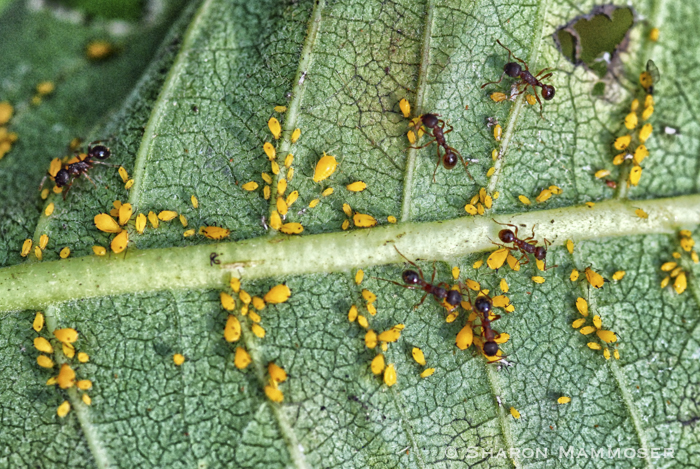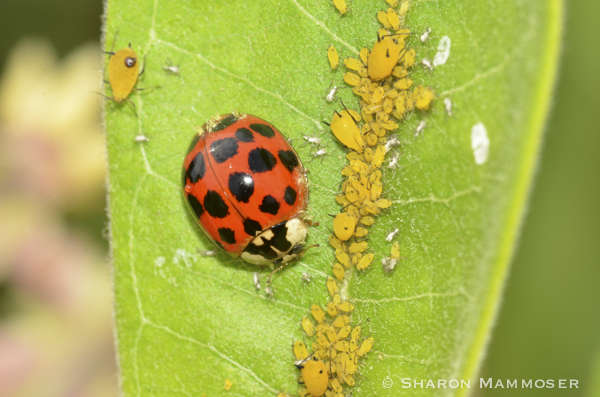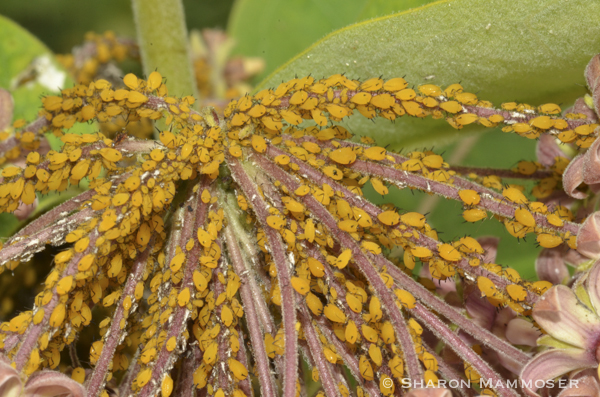Did you know the answer to last week’s puzzler about the relationship of ants to aphids? Have you seen these two insects together in your garden and wondered about them?
Everyone knows ants love sweet things, so it likely comes as no surprise that ants hang out with aphids in order to drink the sweet liquid–called honeydew– that the aphids expel from their butts. Yum! What’s not to love about sugar water! But what about the aphids? Do they get anything from the relationship? As one reader, Elena said, “There is a symbiotic relationship between the ants and the aphids…” The ants ” actually take care of the little insects and protect them from enemies.”

The ants protect the aphids from predators like ladybugs and other insects, even destroying ladybug eggs if they find them on the host plant. Some species of ants even carry “their aphids” to their underground nest where they will keep them until after the winter.
Many ants actually “farm” the aphids, much like a sheep farmer tends his flock. The ants will move the aphids to better feeding areas and if a rainstorm is approaching, they will move the aphid colony to a sheltered spot out of the storm. How the ants know about the impending weather is still in question.
Ants observed in colonies of aphids can be seen stroking the backs of the aphids with their antennae, or “milking” them as it is called. The stroking causes the aphids to expel a yummy droplet of honeydew which the ants readily drink up. Some aphid species have even lost the ability to “poop” on their own and will only do so after an ant has given them a little love.

For many years it seemed like the relationship was 50/50, with both parties getting and sharing equally: ants get honeydew, aphids get protection. But a study by a team at the Imperial College London, Royal Holloway University of London discovered that things aren’t always exactly how they seem. They learned that the ants wear the pants in this relationship–not only do the ants sometimes clip the wings of the aphids so they can’t fly off, they also drug them with chemicals found on their feet. The study showed that aphids who have walked in the pathways of the ants move slower than those not tended by ants and those chemicals inhibit the growth of wings in the aphids–again, causing them to stay in the colony rather than fly off. Aphid colonies tended by ants tend to be larger than those where ants aren’t present–so more honeydew for the ants. Also, if the ants get hungry for something besides sugar water, the aphids are fair game. You can read more from that study HERE.
Or, if you’d rather watch a video, check out this awesome one about some ants in Indonesia and their relationship with mealy bugs–a small insect that is related to aphids and scale insects. I bet you didn’t know that ants were such sophisticated farmers! Don’t you agree that we live in an amazing world! Animals have such incredible adaptations!
Check out the next puzzler HERE, and don’t forget to use the comment box to write your guess. Last week Elena and Caroline commented and so were added to the names for the drawing. All the correct answers will be eligible to be part of the drawing on the Vernal Equinox–March 20th to win the a few greeting cards from my collection. Hope to hear from you soon!

